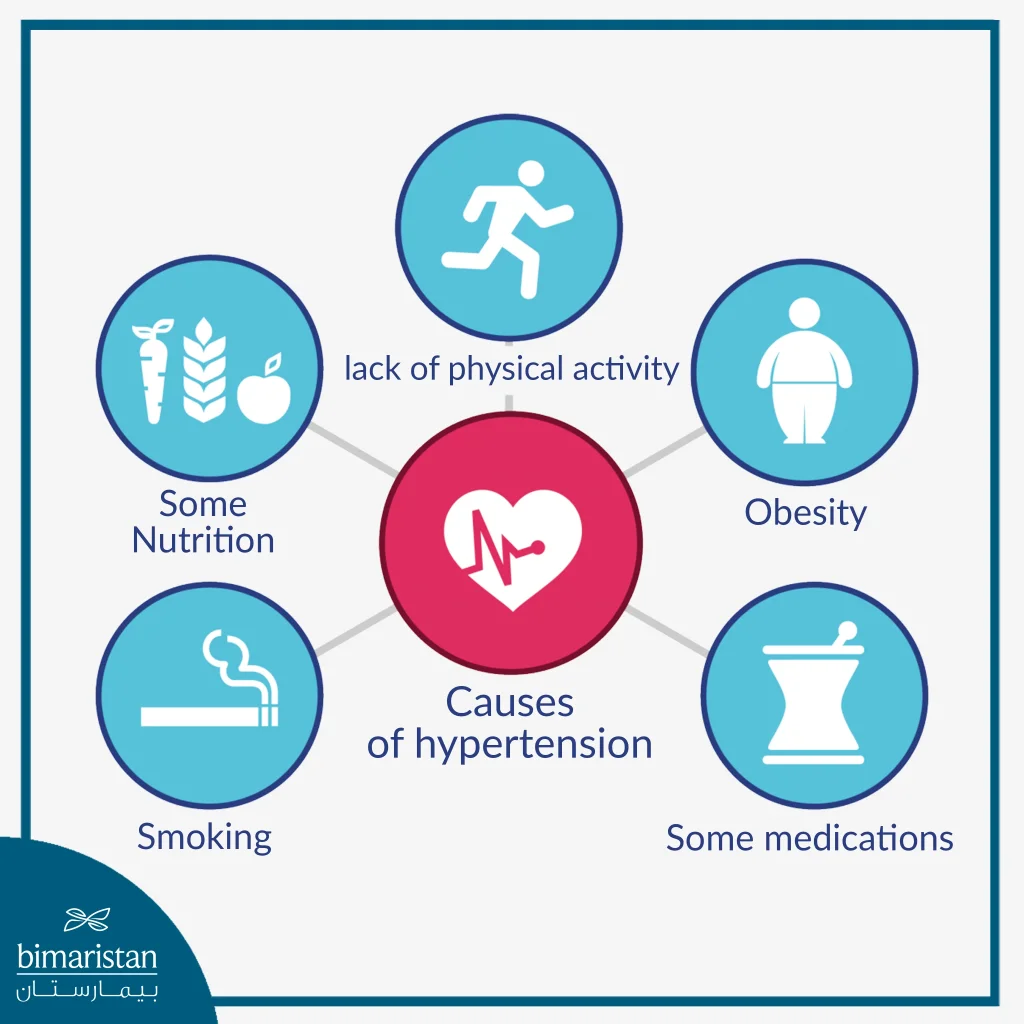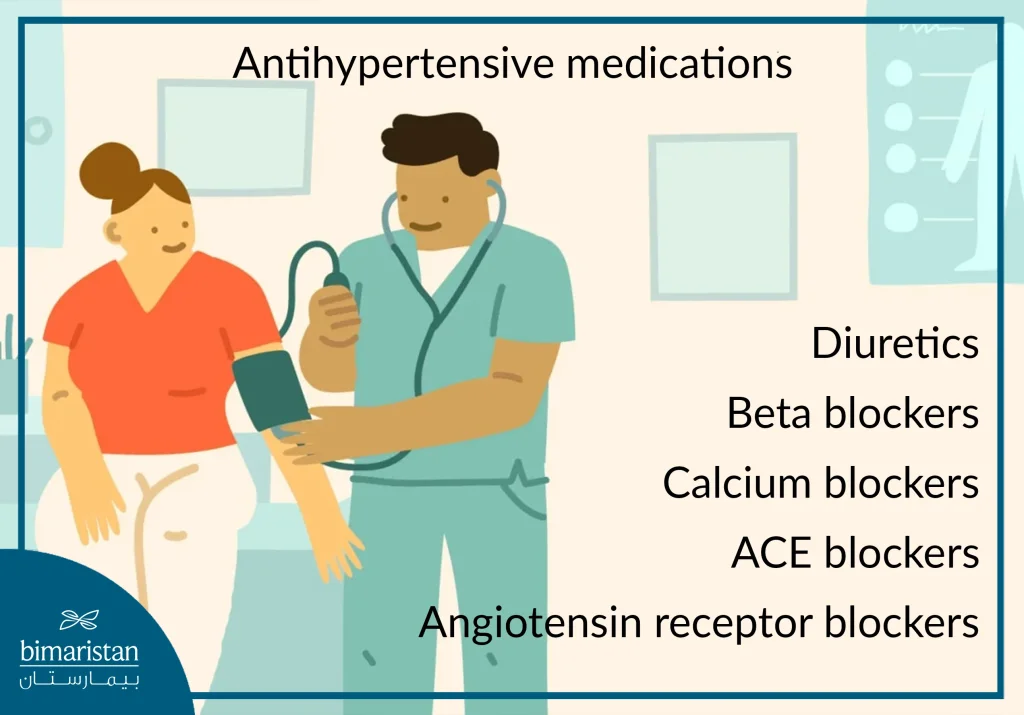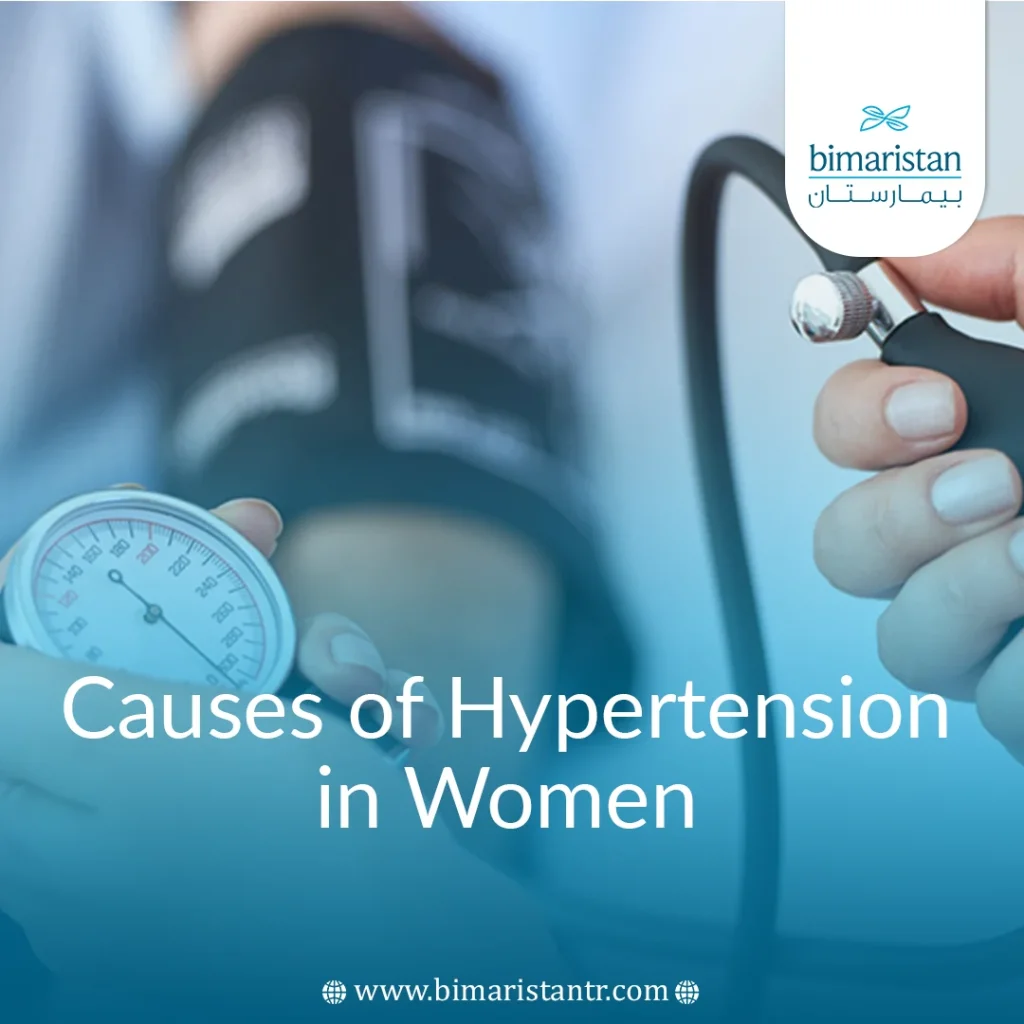There are many causes of hypertension in women. Although men are more susceptible to it, it is still widespread in women.
Women commonly suffer from hypertension during pregnancy, and the chances of developing it increase with age as symptoms of hypertension appear more commonly in women after menopause.
Causes of hypertension in women
The causes of hypertension in women are many and varied and must be known well to prevent complications of high blood pressure that affect women.
Modifiable causes accused of raising blood pressure in women include smoking, obesity, taking birth control pills, and excessive caffeine (coffee).
Eating a lot of foods that contain a large amount of salt causes hypertension, so it is always recommended to avoid increasing table salt to prevent hypertension problems.
The psychological state also plays an important role in increasing the risk of women developing hypertension, as anxiety and depression are classified as risk factors that cause hypertension.
Other non-preventable causes increase the risk of hypertension in women, such as menopause, where the level of the female hormone (estrogen) decreases, which plays an important role in preventing high blood pressure.
Genetic factors increase the chances of developing hypertension in an individual, as having a family history of high blood pressure increases the likelihood of developing hypertension in a person.
Diabetes is also classified among the causes of hypertension in women, as diabetes is a common disease that increases the likelihood of hypertension due to excessive accumulation of sugar inside the blood vessels.
In many cases, the cause of hypertension remains unknown and is then known as primary hypertension, which is often attributed to genetic reasons related to the nature of the female body.
As for hypertension resulting from diagnosed diseases such as hyperthyroidism or kidney disease, the condition is known as secondary hypertension.
Knowing the cause that led to hypertension helps in developing an appropriate treatment plan, as there are many medications used to treat high blood pressure in women.
Hypertension is a common health problem among adults. According to statistics from the World Health Organization, the percentage of people suffering from hypertension around the world is estimated at more than one billion people, with the potential to increase.

Causes of hypertension in pregnant women
Hypertension is a common condition that occurs in pregnant women and should be given special attention because it may affect the health of the mother or the fetus in her womb.
Hypertension in pregnant women does not necessarily lead to serious complications, but it is preferable to keep the woman under observation during pregnancy for fear of complications that affect her health or the health of the fetus in the womb.
There are two types of hypertension during pregnancy: either the high blood pressure is already present, or the high blood pressure appeared at the beginning of pregnancy; in other words, either the cause is due to the pregnancy itself or the woman was suffering from high blood pressure and then became pregnant.
Among the symptoms of hypertension in pregnant women are severe headache, dizziness, frequent urination, nausea and vomiting, the presence of protein in the urine, sudden weight gain, and recording high blood pressure several times during its measurement.
Pregnant women’s experiences with high blood pressure may vary from one woman to another. Some women show clear symptoms of high blood pressure, while others do not show symptoms until a later stage.
As for the causes of high blood pressure in pregnant women, they are:
- Excessive obesity
- Smoking
- First pregnancy
- Multiple pregnancy (twins)
- Alcohol consumption
- Lack of physical activity and a sedentary lifestyle
- Advancing age of the pregnant woman (over 35 years)
- Family history of high blood pressure during pregnancy
- Chronic diseases such as diabetes
Causes of high blood pressure in women after menopause
Women are more susceptible to hypertension after they pass the age of reproductive activity. The reason behind this is the decrease in estrogen levels with age, which contributes to preventing high blood pressure.
As women get older, their chances of developing cardiovascular diseases increase, which can lead to the development of complications that increase their blood pressure.
In addition, an increase in the body mass index is one cause of high blood pressure in older women.
In addition to the above, some women may resort to hormone replacement therapy after menopause, which may cause many complications, such as high blood pressure.
Symptoms of hypertension for women
Most people who suffer from high blood pressure do not complain of any clear symptoms, so high blood pressure is called a silent disease.
In some cases, neurological symptoms of hypertension may be seen, and these symptoms are not specific or directed at high blood pressure. We mention the most important symptoms of hypertension in women:
- A headache that worsens in the morning
- Tinnitus
- Irregular heartbeat of the patient
- Recurrent nosebleeds
- Changes in vision (such as blurred vision)
Diagnosis of hypertension
The diagnosis of high blood pressure is made by measuring the blood pressure in the doctor’s clinic or at home several separate times, as the final diagnosis is not made until 2 to 3 high blood pressure measurements are recorded, with at least 3 weeks between each reading.
Normal (ideal) blood pressure is systolic less than 120 and diastolic less than 80 mm Hg.
An increase in systolic pressure between 120 and 139 and diastolic pressure between 80 and 89 mm Hg is known as pre-morbid hypertension or mild hypertension.
Suppose the systolic pressure exceeds 140 and the diastolic pressure exceeds 90 mm Hg. In that case, the patient is considered to have high blood pressure, which is classified into several degrees according to the severity of the increase.
How to treat hypertension in women
Controlling blood pressure and keeping it within normal limits requires making healthy lifestyle adjustments in addition to drug therapy determined by the doctor.
If the causes of high blood pressure in women are secondary, such as hyperthyroidism, the problem of hyperactivity must be resolved in order to manage the increase in blood pressure.
However, when high blood pressure is primary (of unknown cause), the doctor prescribes blood pressure-lowering medications, which come in many types.
The choice of medication depends on several factors, including the patient’s health condition and the degree of high blood pressure, so it is necessary to consult a doctor before starting treatment so that he can prescribe the appropriate medication for your condition.
There are different drug groups used to treat hypertension, the most important of which are:
Diuretics
They are usually used as a first line in treating hypertension; they work by excreting sodium and water from the body in urine, which contributes to lowering blood pressure.
There are different types of diuretics such as thiazide diuretics and loop diuretics in addition to potassium-sparing diuretics, you can contact the doctors at Bimaristan Center to determine the best treatment for you.
Angiotensin receptor blockers (ACE) inhibitors
A common medication used to treat blood pressure, it works by inhibiting angiotensin receptors, which can disrupt the renin-angiotensin system, which is a mechanism used by the human body to raise blood pressure.
Examples of these medications include Captopril, Lisinopril, and many other medications.
Calcium channel blockers
These drugs work by relaxing the muscles of the blood vessels, which helps to lower blood pressure. This group is usually used to treat high blood pressure in the elderly or when angiotensin receptor blockers are not effective.
Examples include: Amlodipine, Diltazim.
Beta channel blockers
These drugs work by reducing cardiac output and dilating blood vessels, which helps to lower blood pressure. Caution should be exercised when using this drug, as it is not suitable for patients with heart disease or asthma.

Preventing high blood pressure in women
The best way to prevent high blood pressure in women is to make lifestyle changes such as exercising regularly, eating a good diet, and losing weight if you are overweight.
Avoiding smoking and drinking alcohol also helps prevent high blood pressure in women. Suppose there is a family history of first-degree relatives (such as siblings) suffering from high blood pressure. In that case, it is recommended to monitor blood pressure closely in order to diagnose it early.
According to studies, 1 in 3 people who suffer from high blood pressure do not know that they have it, so it is preferable to measure blood pressure periodically to detect it early and prevent long-term complications of high blood pressure.
Sources:
